Embracing ‘yellow’ — addressing anti-Asian hate by squashing stereotypes
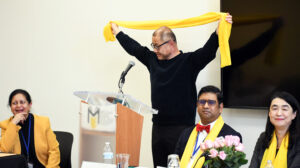
By Nick Masuda | nicholas.masuda31@mec.cuny.edu
You must be good at math. You must be rich. You must love Panda Express.
Senator John Liu has heard it all.
His resume might include time as a New York City City Councilmember, Comptroller of the City of New York or his current spot as the 16th District’s New York State Senator — but that doesn’t exempt him from the plethora of biases that face Asian-Americans throughout the United States.
“So, where are you from?” he’s asked.
“New York City,” he returns.
“No, where are you from?”
Sen. Liu then turned his back to the packed President’s Conference Room at Medgar Evers College, and pointed at his neck.
“If you look really closely, you’ll see that it says, ‘Made in Taiwan.’”
Laughter ensued.
But it was also a reality check that Medgar Evers College is all too familiar with.
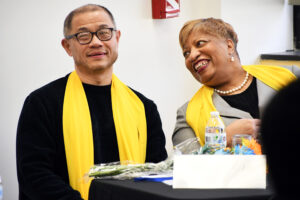
As a Predominantly Black Institution (PBI) and Minority Serving Institution (MSI), students and staff alike know the feeling when minorities are labeled as “other,” despite the data showing that “minorities” are actually the majority now.
On April 10, as part of the CUNY-wide Anti-Hate Initiative that addresses the rise in anti-Asian behavior, Dr. Rupam Saran of Medgar Evers College introduced a panel of experts that helped paint a picture of what it’s like to be Asian in America.
The topic of the day was, “Forever Foreigners or Honorary Whites? The Asian Ethnic Experience Today.”
The panel included Sen. Liu, Kevin Kumashiro (Dean of School of Education, Hofstra University), Rachel Endo (Dean and Professor in the School of Education at University of Washington-Tacoma), Sandie Han (Dean, School of Science and Allied Health, Medgar Evers College) and the Hon. L. Austin D’Souza (Judge, New York Civil Court).
Sen. Liu set the tone with his unabashed tone about the experiences of Asian-Americans, particularly over the past four years as the COVID-19 pandemic was labeled as the “Chinese virus” or “Kung Flu” — among others.
“I experienced this myself, somebody walking down the street, intentionally crossing the street to avoid someone who looks like me,” Sen. Liu said.
Sen. Liu was also very direct about Asian-Americans existing as a community of color — literally and figuratively.
He pointed to African-Americans reclaiming “Black” — “with a Capital B,” Liu remarked — and the LatinX community owning “Brown.”
He doesn’t mind being the poster child for Asian-Americans being “Yellow,” even if it makes people feel uncomfortable.
“I want yellow with a capital ‘Y.’ I’m not technically yellow, but I’m gonna claim it,” said Sen. Liu.
“In the 1960s, we had Yellow Power signs right next to Black Power signs. We are a community of color — when you say BIPOC (Black, Indigenous, Other People of Color) Asian Americans are included in that. I’m proud to be Yellow.”
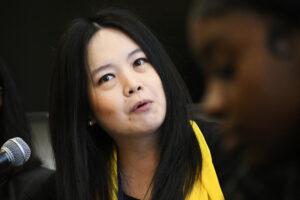
Dean Enzo grew up in the Midwest, where her Japanese parents took their roots in Nebraska.
She grew up with an education that included heroes, holidays and culture that weren’t a reflection of her roots. She witnessed property burning, people spitting at her and racialized violence.
She barely made it through high school.
She pointed to two things as to why her heart wasn’t truly into it: a form of erasure and invisibility, as well as the objectification and unbalanced representations for people that looked like her.
“Can you say for real that you learn accurate balance? Information about your family, your community? Your ancestors, right? Probably not,” she asked the students in the room at Medgar Evers College.
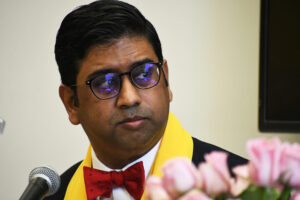
The Hon. D’Souza was in lockstep with Dean Enzo, having seen it throughout the court systems.
“The struggle for racial equality is one that carries on to today. And one that each of us has a part to play in, in resolving and confronting our history supporting each other and rising up together,” he said.
D’Souza, an Indian-American, is putting his words into action, speaking to a commission that he sits on that is fighting racism within the court system, focused on creating an inclusive environment that embraces different cultures.
“They’re celebrated for that and not discriminated against for that. One of the things that we learned a long time ago is that you can’t be what you can’t see. And it’s so important to have a separate role model,” said D’Souza. “We have to normalize the idea that people have different backgrounds and colors.”
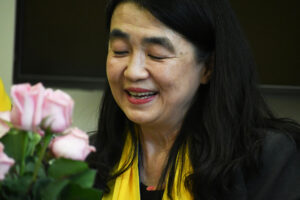
Dean Han joined Medgar Evers College in January, where she took over a prestigious science and allied health department that is well-known.
To get to that point, Hahn has had to fight gender and Asian bias, as there is an undercurrent of false understanding that Asian women don’t do science.
She’s a shining example that this is a false narrative.
And her validation comes not from the classroom, but from her college-aged daughter who wrote a paper for her high school English class that dove into the role of Asian women and the hurdles they face to get equal treatment.
“I didn’t know she was paying attention for all those years,” Han said. “When I read it, I broke down in tears. She is part of the reason why this story can change moving forward.”
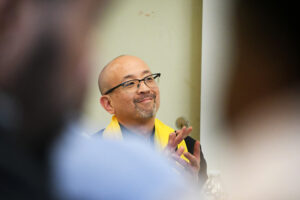
For Dean Kumashiro, he points to a specific flaw in our system that perpetuates hate in general: the focus on the individual instead of the systems in place.
“We presume that the source of racism is the individual,” Kumashiro said. “In moments of crisis — like the rise in hate crimes — we like to feel that it is our job to see who we can blame. Instead, our job should be to ask what is the system that makes this problem possible?”
From the attacks on Critical Race Theory and Diversity, Equity and Inclusion efforts, Kumashiro says that it is instead a distraction maneuver in order to rally support on other issues, such as:
Abortion. Access to guns. Voting rights. Immigration. LGBTQ+ rights. Privatizing schools.
“I think this is what you need to be thinking about when you stir up emotions around things like race and LGBTQ and abortion. You’re not just attacking those groups, you’re mobilizing a base.”
Pointing back to Sen. Liu’s comments on the pandemic, Kumashiro called out the fact that these fallacies aren’t new — and fall in line with others that are coming from the “outside.”
“It’s a 200-year-old narrative that says that these people from Asia bring something dangerous to this country, and that’s why we should be afraid of immigration,” Kumashiro said. “And this should sound familiar, because for every immigrant group, what is it? One of the main things we put out there is why you should not want the immigration because they bring something bad.
“When you talk about the Southern border, what is the common narrative they’re bringing in violence, they’re bringing in drugs. They say too many people who suck up the sort of public system funding and so on, right?
“It is all really trying to blame immigrants for bringing dangerous or harmful things into this country. That’s the larger story.”
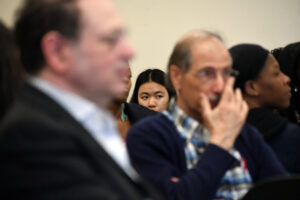
•••
To attend more Anti-Hate Initiative events, please visit our calendar here.

